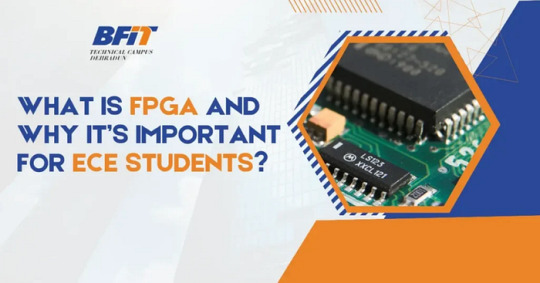#fpga_importance
Explore tagged Tumblr posts
Text
What is FPGA & Why It’s Important for ECE Students?

As an Electronics & Communication Engineering (ECE) student, you must have heard the term FPGA a couple of times. But what exactly is it? Why is everyone talking about it? And most importantly, what does it do for you in your professional life? Well, let’s break it down in the easiest possible manner.
In the modern tech world, electronics is no longer about wires & resistors. The field has expanded & it now encompasses advanced systems such as embedded processors, IoT devices & digital logic designs. And that is where FPGA for ECE students comes in as a lifesaver. Studying FPGA can provide you with a solid advantage, particularly if you intend to work in electronics, robotics, chip design or embedded systems.
What is FPGA in Electronic Engineering?
FPGA is short for Field-Programmable Gate Array. In simple terms, it’s a digital chip that can be programmed after manufacturing. Unlike standard processors (such as the one in your PC), which have pre-programmed functions, FPGAs can be reprogrammed to do many different things.
The good thing about FPGA is that you can create your own logic circuits on it such as creating a tiny processor or creating a custom system tailored to your requirements. This is what makes FPGAs so great in the world of electronics so when someone asks what is FPGA in electronic engineering, they’re referring to a device that allows engineers to create digital systems from the ground up, all in a single chip.
Why Is FPGA Important for ECE Students?
Being an ECE student, you’re supposed to understand how electronic systems operate — not only theoretically but practically as well. This is where FPGA for ECE students comes into the picture. With FPGA, you don’t merely study logic gates or flip-flops; you build systems that use them.
This hands-on experience teaches you about digital design in depth. You get to see how signals travel, how timing occurs & how circuits actually function in the real world. This is something that textbooks can’t teach yet it’s exactly what employers are seeking when they hire.
Other than this, here’s why FPGA is important for ECE students:
• Boosts Practical Knowledge & Skills
FPGAs are commonly used in industries such as telecommunication, defence, medical electronics & consumer equipment. So, becoming familiar with working with FPGA provides practical skills. You will learn about tools such as VHDL or Verilog (for programming FPGA) & simulation tools like Xilinx or Altera.
When you have FPGA for ECE students in your resume, it proves that you not only know theory but can also design & test actual systems. This differentiates you from others at the time of internships, interviews & placements.
• Opens Up Career Opportunities in Core Electronics
One of the big benefits of studying FPGA is that it leads to core electronics career opportunities. Most ECE students end up in IT or software jobs since they don’t have hands-on experience with hardware. But with a good knowledge of FPGA, you can target jobs in embedded systems, VLSI design, robotics, or even the aerospace industry.
Also read: https://bfitgroup.in/fpga-and-its-importance-for-ece-students/
0 notes